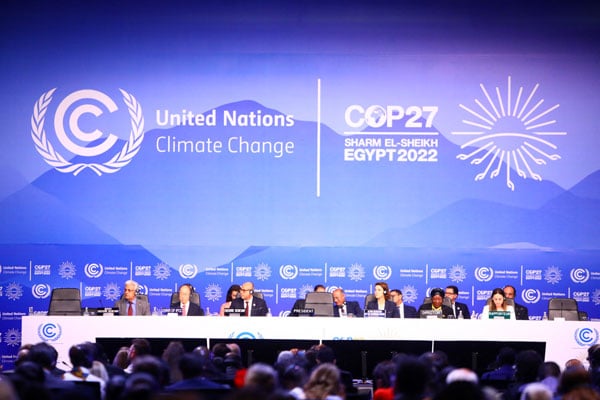West should walk the talk in climate change financing

Delegates attend the opening ceremony of the 2022 United Nations Climate Change Conference, more commonly known as COP27, at the Sharm El Sheikh International Convention Centre, in Egypt's Red Sea resort of the same name.PHOTO / AFP
What you need to know:
The issue: Climate change.
Our view: African governments need this money to finance their climate adaptation plans. But the longer developed countries take to remit this money, the more Africans will starve.
Monday, November 7, marked the first official working day of the Conference of the Parties (COP) 27 as the world’s elite converged in Sharm El Sheikh, Egypt.
But as COP27 marks the 30th anniversary of the adoption of the United Nations Framework Convention on Climate Change (UNFCCC) – an international agreement to combat dangerous human interference with the climate system, adopted in 1992 in Brazil – the world does not seem to be moving at the same pace when it comes to combating climate change.
African leaders were especially critical of their Western counterparts this week when it came to fulfilling their share of climate change financing. South African president Cyril Ramaphosa said while Africa was playing its part, the West was moving at a snail’s pace.
“We need a clear roadmap to deliver on the Glasgow decision to double adaptation financing by 2025, our emphasis must be on the health, well-being, and food and water security of the most vulnerable people in the world,” he said.
Western contributions to climate change adaptation financing has been significantly low. At the Copenhagen COP15 negotiations, developed countries promised to mobilise $100 billion annually by 2020 to address the needs of developing countries.
These funds were intended to come from a wide pool – public and private, bilateral and multilateral, including alternative sources of financing. The United States, for example, was expected to contribute $40b to the fund annually, but as of the latest figures it only provided $7.6 billion in 2020.
President Museveni also came out to criticise the West for what he called hypocrisy. Whereas Africa is scaling up investment in renewable energy and, for the case of South Africa, is on a course to shutting down a number of aging coal-fired power stations, the West is on the other hand restarting them amid its energy crisis.
Sub-Saharan Africa particularly is bearing the brunt of the decades of destruction of the climate by the developed world. Climate justice and financing for the damage this part of the world is experiencing should not be a lot to ask from the West.
Climate change is affecting mostly the poorest of the poor. The prolonged droughts and unreliable rainfall that is affected farming that the average peasant depends on for food and income should be addressed.
African governments need this money to finance their climate adaptation plans. But the longer developed countries take to remit this money, the more Africans will starve like we recently witnessed in Karamoja Sub-region.
As world elite make new promises in Egypt, our view is that they first fulfil their earlier promises.
Our commitment to you
We pledge:
- To be accurate and fair in all we do.
- To be respectful to all in our pursuit of the truth.
- To refuse to accept any compensation beyond that provided by Monitor Publications Ltd. for what we do in our news gathering and decision-making.
Further, we ask that we be informed whenever you feel that we have fallen short in our attempt to keep these commitments.




